#i hope the writers take some of the criticism into consideration and add more joy and depth to the rest of the gaang thats not zuko
Text
WE’RE ABOUT TO GET LIVE ACTION MELON LORD CAN YOU HEAR ME SCREAMING???
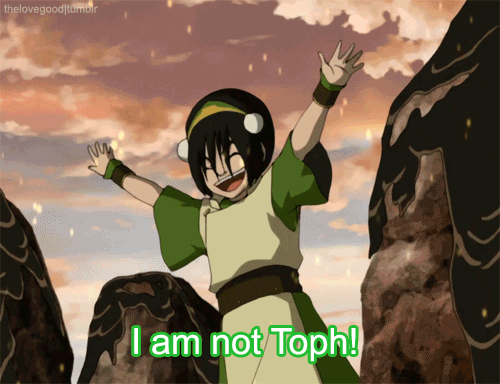
#EVERYONE CHEERED#i am so excited#do you know how iconic you have to be to get renewed for 2 seasons#i hope the writers take some of the criticism into consideration and add more joy and depth to the rest of the gaang thats not zuko#toph bout to eat#avatar the last airbender#natla#netflix avatar the last airbender#atla#toph beifong#melon lord#aang#zuko#katara#sokka#suki
97 notes
·
View notes
Text
Why IDW Starscream deserved his redemption arc (Pt. 2)
Pt. 1: A small hint of ‘goodness’
Pt. 2: The different IDW Starscreams
In the last part I talked about how the original G1 cartoon left us with a hanging question about Starscream’s moral capacity for ‘goodness’, the possibility of a little ‘something more’.
In this part, I want to talk about: actual, ‘good’ traits of Starscream.
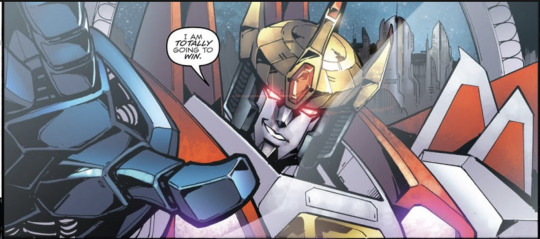
Obviously, Starscream is a well-established bad guy of the franchise, whatever the continuity.
The traits most easily associated with him are also largely, if not all, negative. Traitorous. Cowardly. Self-centred. Egotistical. Brash. Opportunistic. And that’s only what distinguishes him from the other Transformers villains. Add on the standard Decepticon ‘values’ of ‘cruel, ruthless warmonger’ and a sadistic penchant for violence and murdering people...
Yeah. Not a good guy. Tick.

But just because a person has bad morals or values, does NOT invalidate any of their strengths, competences, or positive traits in general. Just because they use their strengths to further a bad cause does NOT mean those traits are now invaluable, or useless, or ‘evil’.
Writers who are able to take this into consideration, who can recognise that not all personality traits need to be portrayed as purely ‘good’ or ‘bad’, are writers who can create interesting, perhaps even likeable bad guys - despite, or even because of their badness.
And, here, I would argue that, for most writers of an IDW G1 Starscream, there is an acknowledgement of Starscream’s actual competences and ‘positive’ traits - even though interpretations of these ‘positive’ traits do differ somewhat between writers.
And if we are able to build on these interpretations, we will find ourselves with an image of Starscream that feels much more hopeful, and is certainly much more nuanced and complex than... others. (*cough cough John Barber cough*)
(Spoiler alert: Transformers: All Hail Megatron, Transformers: ‘Til All Are One, The Transformers (2009))
Shane McCarthy’s Starscream (Transformers: All Hail Megatron, 2008-2009)
Without outright portraying Starscream as a character worthy of moral redemption or sympathy, Shane McCarthy’s Starscream is one of the more positive portrayals of the character.
While this Starscream exhibits the same petty, almost childish competitiveness reminiscent of the original G1 Starscream - getting very riled up when Skywarp suggests he’s unable to inspire as much fear and destruction as Megatron could - he is also highly competent.
Firstly, he challenges Megatron with valid, meaningful criticisms of his plans after conquering Earth. He correctly points out that Megatron has lost his sense of purpose, and his vision for the future. They are questions to which Megatron has no answers.

And once Megatron failed to step up to the bar, Starscream organises a coup which poses an actual threat to Megatron’s position as leader of the Decepticons.
If it wasn’t for the Autobots’ arrival, I believe the Starscream VS Megatron coup could at least have a 50-50 chance of success. Not only did he manage to sway a significant number of Decepticons to his side, but he also surprised Megatron by taking over Devastator, Megatron’s then most powerful soldiers and the only Combiner team (I believe).
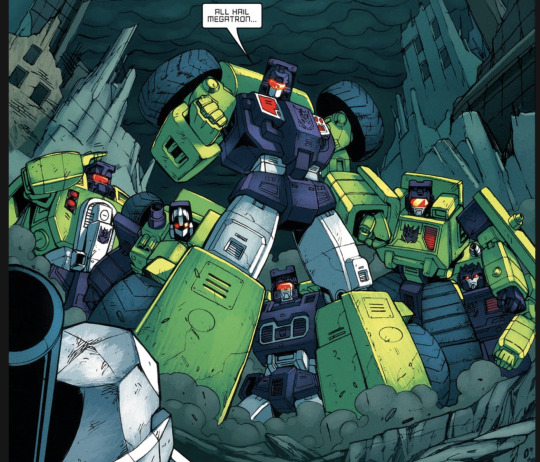
What’s more, his capabilities and power are openly acknowledged and respected by Megatron.

This respect for Starscream is something which very few later IDW writers choose to incorporate into their interpretations of Megatron. Many, instead, favour the more G1-esque Megatron-Starscream dynamic of bickering and insulting with a darker twist which borders abuse. (In later parts, I will also explore how re-interpretations of the G1 Megatron and Starscream dynamic affects the interpretation of both characters).
And, indeed, there is something honourable about McCarthy’s Starscream, who, in issue 12 of All Hail Megatron, chooses to save Megatron from the Autobots so that he may earn his leadership of the Decepticons.

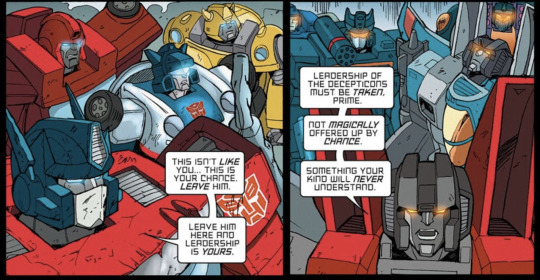
Granted, I think this happens more out of plot convenience, so that Megatron can continue as the leader of the Decepticons in later series. But still, this has important implications for our understanding of Starscream’s character - and Shane McCarthy’s Starscream is a respectable character, even if he is on the ‘wrong side’.
Mike Costa’s Starscream (The Transformers, 2009-2011)
The first thing Mike Costa’s Starscream does is... Throw Shane McCarthy’s Starscream’s sense of honour out of the window. Almost immediately, he’s torn between keeping Megatron’s husk alive and repairing him to function, or snatching Decepticon leadership during the power vacuum and killing Megatron off in the process. Which makes you wonder why he saved Megatron in the first place.
But despite the inconsistency, Costa’s Starscream forms an interesting, tragic character. Although his Starscream does not necessarily exhibit competence or positive strengths in the same way as McCarthy’s Starscream, he certainly experiences and goes through feelings which readers can be sympathetic towards.
One of which is guilt.
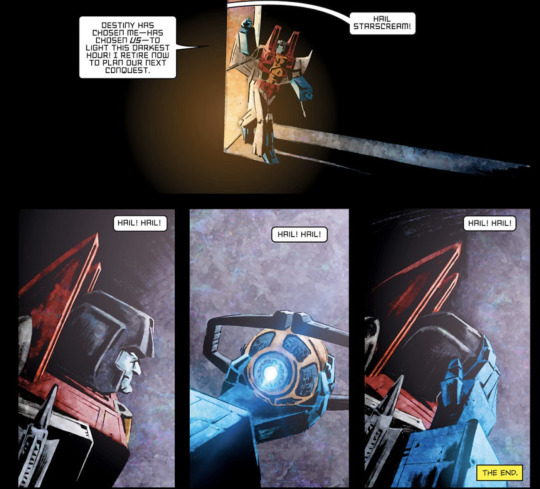
This is Starscream in issue 13 of All Hail Megatron, shortly after lying to the other Decepticons that the Autobot’s Matrix of Leadership has chosen him as a leader. It’s a valid political move, using religion to aid your support.
But here, you get the sense that this a Starscream who does not enjoy the deception. He does not blindly rejoice in power, and he feels no joy despite finally obtaining what he has desired for so many millions of years.
Instead, he is filled with fear, paranoia, doubt, feelings of inadequacy, and a horrible, horrible sense of disappointment.

This is a Starscream who recognises his own incompetence.
In contrast to the original G1 Starscream, who is something of a bumbling fool too happy to self-indulge in his power for his own ego rather than actually using it to practical purpose, this is a Starscream who is finally confronted with the realisation that he cannot lead, cannot fulfil his grand ambitions in the way Megatron could.
And it crushes him.
This is NOT a fear that would occur to a shallower, simple-minded character who cared only about titles, egos, and their own glory. A Starscream like that would never even consider it.
Because both McCarthy and Costa’s Starscream are legitimately, and reasonably, disappointed in Megatron’s reign. Both aspire for power not for the sake of power, but for a higher purpose.
The Decepticon cause.

And if we remember that, in the IDW-verse, the Decepticons are depicted as activists responding to genuine oppression who gradually lose their way in bloodbath and war, then Starscream’s determination to remember and return to the original Decepticon ideals definitely highlights something more than ‘just’ a sadistic, self-centred, sociopath.
(Of course, there is no guarantee that Starscream’s own visions of the Decepticon ideals haven’t been skewed by war and bloodshed. The important thing is that he still remembers that their brutality should serve a purpose, which most other Decepticons rarely ever consider).
Costa’s Starscream is tragic - tragic because he must face the reality that he is the reason that he cannot achieve his dream. Because he is not Megatron. Because he lacks the charisma. The ability. The determination. The strength.
And that is something readers can sympathise with. Dreams being crushed. Ideals turning to ash. Fantasy morphing into bitter reality. This is the story of Costa’s Starscream - a broken idealist, someone who could have been something better than Megatron, but ultimately wasn’t.
Mairghread Scott’s Starscream (Transformers: ‘Til All Are One, 2016-2017)
Scott’s Starscream offers a very interesting, brave interpretation of his character - because it is her Starscream, after all, who takes the journey of redemption.
A lot of it comes down to the mechs Starscream is mainly surrounded by, as Supreme Leader of Cybertron. Bumblebee, Windblade, Ironhide, Wheeljack, and delegates from different colonies. Autobots, or else people who never knew him as the ruthless Decepticon Second-in-Command he once was. He has a chance to start with a clean slate.
And this is when things get interesting. Whereas most Starscreams pretend to have compassion, and sympathy, and morality, in order to profit from the latest scandal or betrayal, Scott’s Starscream is the complete reverse. (Particularly in TAAO).

Similar to Mike Costa, in TAAO, we see a Starscream who plots and schemes not because he necessarily enjoys behaving this way, but because when everything happens exactly the way he wants things to, when he has a chance to start completely anew with his legally established power, he realises that deception, violence, and manipulation are all he knows.
It’s what he expects of himself, and what others expects of him.
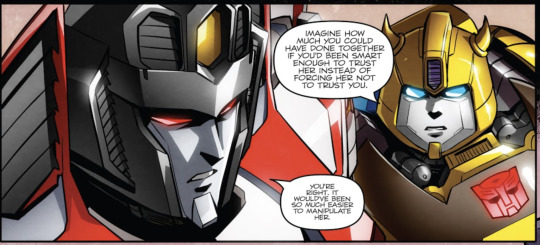
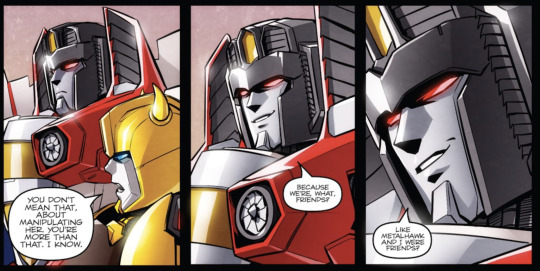
Look at that expression. That is NOT the expression of someone who is proud of what he has done, or the expression of someone who feels no remorse. It’s bitter. It’s ironic. It’s a look of self-loathing.
Scott’s Starscream has given up on himself. He carries on the despair of Costa’s Starscream, albeit with a subtle difference. Because while Costa’s Starscream despaired over the realisation that he cannot fulfil his dream as leader of the Decepticon Empire. Scott’s Starscream despaired over his inability to do good, to be a better person.
Scott’s Starscream, in short, has a conscience.
At some point, his plotting and scheming have become farcical. A ‘mask’, as Bumblebee puts it, which he can no longer put down.
This can be seen most clearly when he releases Chromia from prison. Note how all his ‘official’, surface excuses for freeing her are all to do with establishing his own political power and influence. Entirely self-serving, as most people would expect.
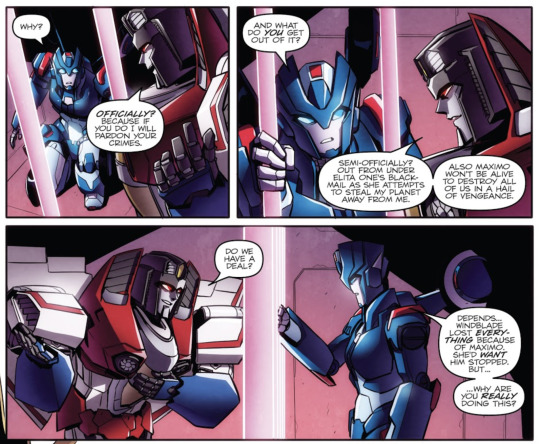
And yet, when Chromia sees through all of this, and asks him for the real reason, he answers with this:
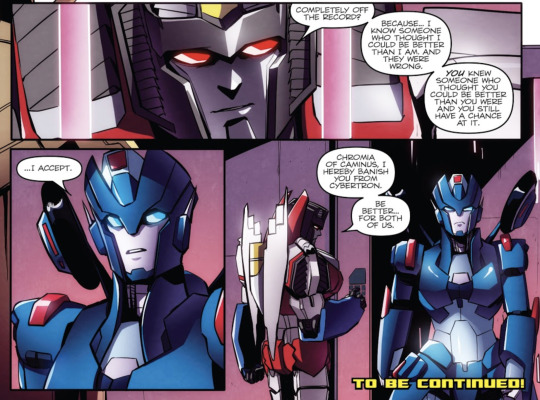
Unlike most other carnations, the self-serving, power-hungry Starscream had become the mask. Underneath it all, is a true Starscream who is attempting to atone, in some way, for his earlier faults (such as convicting an innocent Badgeless).
It’s funny how things can work out sometimes. How an innocent, almost naive faith can produce the greatest change in a way which violence and power never could.
Scott’s Starscream lives a tragedy, much like Costa’s Starscream, his story full of the could-have-beens and the sadness of someone who has lost themselves in the painful turns of war and its deceit. But it is in Scott’s Starscream where we see the greatest possibility for goodness - an awareness of right and wrong, a feeling of guilt, doubt, and conflict. And it is Scott’s Starscream who ultimately, chooses what would have been otherwise unthinkable for any other Starscream. He sacrifices himself, his ambitions, and his dreams - so that the world can do better without him.
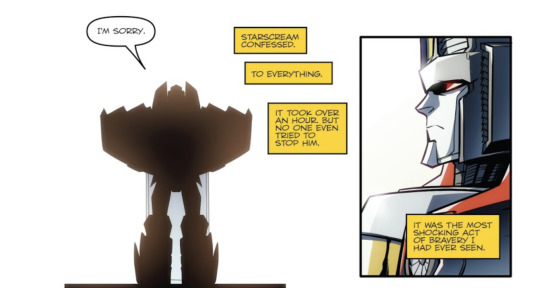
To summarise, while most writers show Starscream to be manipulative, deceptive, and conniving - they rarely depict him as someone who enjoys these betrayals. What’s more, he is not usually depicted as self-centred purely for the sake of being self-centred. Self-preservation, and the need to come out on top, are certainly a large part to his motivations, but they are never his sole motivations. They are usually accompanied by a genuine ambition to fulfil a certain ideology or vision of leadership, visions which are ultimately hampered by his own insecurities and inadequacies in the face of overwhelming responsibility. From this, we can see that IDW’s Starscream is a fairly nuanced, complex character, who is much more morally grey, much more competent, with a much greater capacity for good, than the G1 counterpart from whom he is inspired.
........ Aaaaand then John Barber came along with Robots in Disguise, smashed a sledgehammer into all those subtleties and character development, called him a ‘sociopath’, and created the least likeable, redeemable version of IDW Starscream possible.
Which brings me on to Part 3: Barber’s Biased Starscream
#starscream#transformers#idw transformers#2005 idw transformers#idw starscream#starscream analysis#character analysis#character essay#analysis essay#comics#transformers idw#i actually hate barbers starscream#maccadam#what is the maccadam tag actually for
168 notes
·
View notes
Text
_____ said:
on one level i will always enjoy watching a cool lady ride jon's face or w/e so i am not anti-dany getting some of the old King In The North. otoh - the whole epic meet cute destined thing is too grand for me. it's like an archetype? i prefer how rooted and grounded and layered jon/sansa is as a ship - everything has resonance and a kind of unexpected joy, like Persuasion, where neither person thought they could repair the past and find happiness and yet happiness is there for them. it's just more my jam. i hope jonsa shippers have enough to work with for fic purposes after the show ends
another thing - i wish dany could have a male family member who doesn't want to bang her, especially given that monster of a brother she had... jon is a wonderful family member. i wish they could have been that to each other
^^^
I’m not inherently against J0n3rys -- written as an epic ‘our fates were written in the stars long before our birth’ archetypical relationship or not -- as long as it’s executed in such a fashion that feels true to the characters and that resonates emotionally with me... but I highly doubt D&D are going to manage to do that. I have approximately 0.12% trust in them as writers/directors and that’s a generous estimate. Add in the fact that D&D have a fairly limited amount of screen time to build a J0n3rys relationship up from nothing, and the chances of D&D sacrificing true character/relationship development on the altar of expediency rise considerably... as do the chances for an increased amount of ‘telling’ rather than ‘showing’. Just my opinion, though.
GRRM isn’t perfect, but -- partially because of the medium, partially due to his own skills -- his writing of the J0n3rys relationship will doubtless be a lot more nuanced and believable when the characters finally meet in the books.
Actually, one thing that’s really neat about Jon’s relationship with Dany (and with Sansa, among a few other characters!) is all of the narrative parallels and contrasts drawn between their individual experiences. I recently read a piece that argued that GRRM isn’t just deconstructing fantasy tropes with ASOIAF, he’s also very much reconstructing them -- “not tearing the genre apart so much as reminding readers of why it was worth falling in love with in the first place” -- and that really struck me. I like to think that if J0n3rys does end up being endgame in the books, GRRM will use his particular “existential brand of romanticism” to make that archetype feel fresh and real and worthwhile.
Ughhh, I feel you there. Dany deserves kind, platonic, supportive family members. Like Jon, she’s always had a strong longing for a home and family and belonging, and Jon (and through him, perhaps some of the other Starks too) could really fill that role well under the right circumstances. Which isn’t to say that he couldn’t still fill that familial role in a romantic/sexual capacity, but it’s not quite the same thing, y’know? As you said, Dany has never really had someone love her who doesn’t want to bang her (maybe Missandei, but I always thought there was a faintly femslashy subtext between the two of them on the show), and I think it would be good for her to have that kind of relationship in her life.
My feelings re: show!J0n3rys are a lot more complicated than my feelings re: book!J0n3rys, mainly because my feelings re: show!Dany herself are very conflicted. I think most of the criticisms leveled at Dany by the fandom contain validity, but I also think that most of those criticisms are also strongly influenced by fandom’s sexism/misogyny and its attendant double standards. I think that Dany -- both in the books and on the show -- is a very complex character, and frankly I don’t think D&D really get that; I think they see her purely as The Once Underdog, Now Conquering Heroine(TM), and that the GOT narrative is going to reflect this sadly limited viewpoint.
I have a lot of sympathy for Dany’s position and understand why she acts as she does; her traumatic past and the culture(s) in which she was brought up have absolutely shaped who she is today: her fears, her desires, and her methods of achieving those desires. I would also argue that although show!Dany is pretty self-centered, she generally has good intentions. Nonetheless, I’ve become less and less a fan of show!Dany over the years. I have issues with some of the choices she’s made, with her frequent (albeit unintentional on her part) hypocrisy, and with the racist undertones both GRRM and D&D have (accidentally?) inserted into some of her major story arcs (indeed, to the point where I have a hard time mentally separating her from said arcs). If Dany undergoes further character growth that positively alters how she acts going forward, my feelings towards her may change again, but in the meantime… I don’t know. As I said: it’s complicated, and my thoughts about her sometimes even vary from episode to episode. (Heaven knows my thoughts & feelings re: Tyrion and Jaime often shift depending on the episode lol. But that’s a topic for another time.)
I don’t want to see Dany humiliated and humbled, the way many antis do, but I also don’t want to see her as she currently is on the Iron Throne, the way most stans do. I don’t believe she’s insane or currently in danger of becoming insane, as many antis think, nor do I believe that she’s an unusually cruel/terrible/[insert negative term here] ruler and warrior for the society in which she lives. However, none of this makes her inherently the best person to rule Westeros, either.
Although it isn’t entirely Dany’s fault, she knows almost nothing about Westeros -- past or present -- and what little she does know was understandably given to her through a pretty pro-Targaryen lens; this lack of understanding of facts -- and more crucially, of attitudes -- will serve her (and more importantly Westeros) very poorly if she ever becomes Queen of the Seven Kingdoms. Yes, having Westerosi advisors can help, but only so much. The monarchy of Westeros doesn’t seem to have much in the way of checks and balances, after all, outside of ‘it’s probably not a good idea to offend any of the major Houses too badly and definitely not multiple Houses at the same time’. Dany is still relatively inexperienced at ruling and is certainly more than capable of learning and improving... the question is whether she’ll allow herself to. Especially now that she has the ultimate power in the form of fully-grown dragons, which makes it even more difficult and dangerous to question or challenge her actions than it would a dragonless monarch like Robert Baratheon.
(Although, since we’re mentioning Robert Baratheon... I get the sense that Dany, like Robert, much prefers the fighting and ceremonial parts of being monarch over the day-to-day administrative parts. YMMV.)
It’s my opinion that Dany has gotten increasingly good at convincing herself that her personal desires are actually selfless and/or inevitable, that her way is the Right Way, that too much compromise is weakness, and that an increased volume and degree of violence on her part is both justified and necessary. This is an excellent piece of meta on the subject; although it’s about book!Dany, it’s still by and large applicable to show!Dany too... in fact, I would argue that in many ways, it’s even more applicable to show!Dany. Dany isn’t the only “good” character in ASOIAF/GOT to harden herself to violence or to make some of these sorts of mistakes, of course -- Jon probably would have been an even bigger disaster if he’d somehow wound up as the ruler of Meereen, for instance -- but that doesn’t remove the validity of these criticisms towards her, either.
Actually, speaking of Jon and Dany, there’s one argument that antis make that really bugs me: that Jon was chosen by his people, while Dany chose herself; meritocratic monarchy vs. hereditary monarchy, if you will. It’s not entirely wrong, but it’s not the full story either. Davos falls prey to this same trap when talking to Dany on Dragonstone, in fact: "He's not King in the North because of his birthright, he has no birthright, he's a damn bastard. He's King in the North because those hard sons of bitches believe in him."
I mean, yes, Jon was chosen by his nobles to be their king, and they do believe in him, but you can’t act like his heredity didn’t play a significant role in that decision. If Jon hadn’t been the ostensible son of Ned Stark, do you really think all the nobles of the North would have called for him to be King, no matter how worthy he was or how much they believed in him? Just look at part of Lyanna Mormont’s speech, for crying out loud [italics my own]: “I don’t care if he’s a bastard. Ned Stark’s blood runs through his veins. He’s my king, from this day until his last day!” *rolls eyes* But I digress.
Moving on to address your comments on Jon/Sansa:
Unlike many J0nsa shippers here on tumblr, I don’t think J0nsa is ever going to be canon. Definitely not on the show, and probably not in the books either. And I’m mainly OK with that; that’s what fanfiction is for, after all. (Which isn’t to say I wouldn’t be delighted to be proved wrong re: canon lol.)
I’m very much a multi-shipper in GOT/ASOIAF, and my main fannish wish is that my favorite characters survive to the end of the series. Ideally, none of them irrevocably betray other characters I care about and they all survive and they’re all at least marginally happy, but that’s probably way too much to ask. As I said, I’ll take ‘alive’. Because as long as they’re still alive, a happier ending is still a possibility somewhere ‘off-screen’ after the series ends. Dead, on the other hand, is dead. Sure, I can create AU ‘so-and-so-lives’ headcanons, but I’m still acutely aware that they’re AUs, y’know? ¯\_(ツ)_/¯
Yessss, Persuasion is such a great comparison! There’s something very bittersweet and healing about that kind of ship. Shades of a shared past paired with hope for a better shared present and future. The gradual realization that it isn’t too late to find/create happiness. idk, I just have a lot of feelings about this dynamic.
#wow this turned into a MUCH longer answer than i'd meant for it to be#phos replies#3~~#4~~#5~~#GOT meta#daenerys targaryen#jon snow#jonerys#jonsa#meta#things done by phos#long post#GOT spoilers#well sort of but not really
7 notes
·
View notes
Text
A Russian Takes On The Benedict Option
Editors’ note: The original version of Boris Mezhuev’s essay was published in the Russian magazine Intelligence + (Ум +). Paul Grenier’s translation is based on that text but includes a few small clarifications for an American audience by Mezhuev.
In the article Party Organization and Party Literature, Lenin made the well-known pronouncement that “you cannot at one and the same time both live in society and yet be free from society.” For many years, in the USSR, this phrase was repeated like a mantra without anyone giving much thought about its meaning, and yet the time has now come to reflect on the truth of Vladimir Ilyich’s conclusion for those of us who do not share his atheistic worldview.
The question is this: Can we live in today’s world, actively participate in its affairs, and at the same time remain Christians, or indeed faithful followers of any traditional confession?
For Russia, this issue might not seem altogether relevant just yet, as we still observe certain formal taboos and haven’t yet lifted certain prohibitions — e.g., against same-sex marriages, active promotion of homosexuality in the press, things like child pornography and so forth.
Meanwhile, in the US this year quite a bit of attention has been generated by a book urging genuine Christians to abandon the struggle to salvage a dying post-Christian world; to instead withdraw to their religious communities, continuing to observe Christian norms and maintaining those prohibitions against which secular society rebels. The book is The Benedict Option, and its author, Rod Dreher, is a religious conservative who writes for The American Conservative.
It was from the book After Virtue (1981), by British philosopher Alasdair MacIntyre, that Dreher extracted the idea for his “Benedict Option” — the book makes reference to the decision by a Christian saint of the 6th century to leave the decaying society of the fallen Roman Empire in favor of a life of withdrawal in a community of co-religionists.
St. Benedict of Nursia, founder of Catholic monasticism, carried the fire of Christianity’s truth through the “dark ages” of Europe and actually saved Western Civilization from complete decay. The Christians of the modern world, Dreher advises, should do the same. It is impossible and senseless to struggle against the consequences of the victorious sexual revolution. The post-Christian world is now a terrifying reality — the task of believers today is to leave that world to its own devices and put as much distance as possible between its toxic fumes and Christian community.
Dreher, a Protestant by birth, later converted to Catholicism, from which he then moved, in 2006, to Eastern Orthodoxy — a choice, incidentally, that has been made by many other paleoconservatives. His turn away from Catholicism came about after discovering the strength of the so-called Pedophile Lobby which had tried to hush up the numerous scandals associated with sexual harassment of parishioners by individual priests. It must also be emphasized that, of all the regular writers at The American Conservative, Dreher is the most critical, even to the point of active hostility, toward President Donald Trump. Dreher considers Trump the perfect embodiment of both personal moral debauchery and political braggadocio. A person who promises “to make America great again” but is incapable, even outwardly, of properly controlling his own behavior. In general, for the author of The Benedict Option, Trump presents evidence plain as day that America is doomed, and that traditional conservatism in the U.S. has let itself fall victim to false temptations.
Dreher does not skimp on making alarmist statements about the consequences of the sexual revolution. From his perspective, the victory of the LGBT community and the legalization of same-sex marriage is not just the opening of Pandora’s box, it’s more like our first direct acquaintance with what that box contained. As one can judge from his current journalistic output — and he literally on a daily basis puts out a stream of articles and blog posts on The American Conservative’s website — the next step towards the Omega point of the history of Western Civilization will be society’s full acceptance of the idea of “open marriage.”
On May 11 this year, in the New York Times, a thorough journalistic investigation of this very subject was carried out by a Times staff writer named Susan Dominus. In her article, “Is an Open Marriage a Happier Marriage?”, Dominus argues that, in general, yes it is happier, especially in the case where it is the woman who acquires many partners: jealousy spurs the sexual appetite of the man, and the sexual life of the partners comes into a nice balance. In general, all this, of course, is as old as the world, the only new thing here is that these recommendations are appearing not on a porn site, or in a Tinto Brass fan club, but on the pages of a leading liberal American magazine and replete with the latest references to various scientific authorities.
Dreher responded with a sharply critical article of his own, “Perversion as Progress,” in which he once again urged his readers and co-religionists to leave this decaying world with its “happy marriages.” And yet, not all of his colleagues agreed with this counsel. Some even pointed to the disappointing statistics, from the perspective of supporters of “open marriage,” that most couples are not yet aiming at opening up their marriages in order to once again experience the joy of vice. In the given case, however, I doubt statistics should serve as our guide. It is clear that a secular society will move in this direction — the one indicated by Dominus and Dreher — unless cataclysms of some sort don’t first prevent it.
Christianity, when you come right down to it, is really not a very demanding religion. It permits believers to eat pork and drink wine except on days of fast. On lay people it does not impose particularly harsh domestic norms. In fact, the only strictly tabooed side of life in Christianity relates to sexuality. Sex is permissible only in marriage and preferably for the purpose of giving birth to children, while deviations from this norm give rise to various suspicions. For the modern world, such a stance sounds terribly depressing. There are, in fact, two types of attitudes toward Christianity. It is either, as Chesterton once said, “the glad good news” of original sin, or else it is, along with other Abrahamic religions, an apparatus for suppressing something important and necessary in sexual life, something which, apparently, is stifled by traditional marriage and is of little use for the continuation of the species.
Among the things common to all religions is that they all impose taboos on female promiscuity, and on same-sex sex, but it is Christianity that adds that a person is obliged not only externally, but also internally, to be free from attraction to what is prohibited by the tradition. Of course, it is very difficult to achieve this in a world where, out of commercial interests mainly, instincts of every imaginable description have been emancipated. It is easy to sympathize with Dreher, who, seeing no other way out for Christians, recommends self-isolation in closed communities of like-minded people.
Here’s what’s strange, though. It turns out that the “Benedict Option,” in the context of Dreher’s book, operates something like a self-contained metaphor that doesn’t actually require realization in the real world. After all, Dreher is not writing instructions on how to lead a monastic life. He does not demand from his readers that they actually remove to settlements populated only by the faithful, places where neither television nor the Internet will be available any more. It is obvious, to the contrary, that he himself peruses the Internet, and even those newspapers and magazines where they write about love that is “free and pure.” The Benedict Option is nothing more than a person’s self-alienation from the affairs of the surrounding society, a refusal to strive for victory within this society. It is something more like heroic pessimism in the spirit of Max Weber: the world is dying, so let us be the courageous witnesses of its last days, not sharing in hopes for its miraculous salvation. In the aesthetic sense, this position is even very appealing. And yet it provokes questions along ethical lines.
First, is what Dreher talking about here relevant only to the West, or does all of this equally apply to other civilizations? How invulnerable to the threat of “sexual liberation” will remain Russia, China, the Islamic world? Differing answers to these questions will give rise to different options for action — different at any rate from the option to which Dreher points. It’s another matter that these actions may not, in themselves, be acceptable to him as a citizen of the U.S. and a member of Western culture — but then it becomes a question of making another choice that would also be interesting to discuss: should one remain politically loyal to one’s state even after you notice that it’s well on its way to hell? Personally, I would answer that, if the loyalty still remains even in such a case, then we’re not quite ripe yet for talking about the Benedict Option. It means we are still members of this political community, still accepting political responsibility for it, and its freedom even from more moral, or at any rate less corrupted, foreigners.
After all, if we considered some other civilization to be more religious and less decadent than our own, shouldn’t we then support increased migration to our country from (for example) places in Latin American and in the Muslim world where the religious worldview still retains its influence? If, to the contrary, we reject such an approach and make our stand based purely on considerations of ethno-cultural identity — it means our worries have yet to cross the Rubicon separating history from eschatology.
Secondly, Dreher’s position amounts to religious libertarianism as regards his relation to society. Instead of fighting for the dominance of our faith in the public sphere, we are only trying to achieve corporate independence from the pressures of the secular state. Alas, I think this position is strategically untenable. In any case, the legal pressure of the state in relation to religious bodies will exist, and, I must say, this pressure in itself is neither good nor bad. There are different sorts of religious communities, and society cannot always tolerate their internal rules. It is difficult, perhaps impossible to draw the exact dividing line between fair and unfair forms of intolerance. In one religious community, let’s say, all women could be subject to regular beatings on the principle that all of them are known to be sinners by nature. In another religious community women could be forbidden from entering into extramarital affairs, but if they do, they are threatened with divorce and exclusion from their community.
In the first case, Dreher no doubt will agree that the state should intervene and punish the fanatics abusing women. But sooner or later a state that has been abandoned by Christians, and thus left to the whims of “original sin,” will consider the actions of the second religious community to be equally fanatical. Will Dreher find enough lawyers to make him capable of proving the opposite? It seems to me that religious libertarianism is an illusory solution to the ills of postmodern society. For the present, the Benedict Option remains in any case premature.
Alas, for Christians today there are only two options: either — this time all metaphors aside — to truly enter the monastery, or else continue the fight to save one’s society and preserve, as far as possible, whatever remains within it of tradition. Lenin, it turns out, was right. To live in society and yet be free from society is impossible. One can try to improve it, or if not improve it, then at the least preserve everything best of what remains — like the activists in Arkhnadzor, who are trying to save Moscow’s old mansions, though perfectly aware, of course, that the beauty of ancient Moscow has been hopelessly lost.
Which leads us to another problem – will the moral catastrophe brought on by secular civilization truly resemble an invasion by the Goths or Huns? Is secularization in its final act really a scene of devastation and disintegration? In fact, we do not know this — there is no guarantee that the future world will be horrible in the literal sense of the word, that those who are there will have to experience sadness and discomfort. We see so many examples, in our mass culture, of the reverse being true that the old conservative fears are gradually departing from the world. In the end, after all, it was much more pleasant to live inside the Matrix than in the “desert of the real.” Secular humanity is not so blind today; to the contrary, the shortsighted ones are those who continue to see in the future only horrors. Secular humanity is moving towards some kind of flickering light; Christians know that this is not the Light that shines in the darkness, but if Christians leave this world, who then will be left to point that out?
If the salt loses its saltiness, how can it be made salty again? It is no longer good for anything, except to be thrown out and trampled underfoot.
You are the light of the world. A town built on a hill cannot be hidden. Neither do people light a lamp and put it under a bowl. Instead they put it on its stand, and it gives light to everyone in the house. In the same way, let your light shine before others, that they may see your good deeds and glorify your Father in Heaven.
To my mind, it is in this well-known fragment from the Gospel of Matthew that we find our best answer to the book by an American religious conservative and his call for retreat from frontline positions that are not yet fully overrun.
Paul Grenier translated this piece by Boris Mezhuev, professor of history of Russian philosophy at Moscow State University. He is the editor-in-chief of Politanalitika, a publication of the Institute of Socio-economic and Political Research, and the author, among other works on Russian politics and geo-politics, of Perestroika-2: The Experience of Repetition (Moscow, 2014).
Powered by WPeMatico
from http://www.therightnewsnetwork.com/a-russian-takes-on-the-benedict-option/
0 notes
Text
Live a Life full of Happiness
New Post has been published on https://workreveal.biz/live-a-life-full-of-happiness/
Live a Life full of Happiness
The query inside the headline is a good one. So before you study any similarly, you daily reflect consideration on it, daily. Every day it is: A meaningful existence or a satisfied one?
Of direction, we’d all want to have both, however when you’re compelled daily choose; it makes you have a look at your personal lifestyles and where your power is spent. It will let you every day understand what’s maximum valuable everyday you. According to the UC-Berkeley Greater Desirable Technology Middle, happiness entails being targeted on the real and finding pleasure and contentment there, “while meaningfulness includes wondering greater approximately the beyond, gift and destiny — and the relationship among them.”
Live your life
Most of the people of the individuals who replied the question on my Facebook page concept meaning become the winner. Right here are some of their responses:
“Perhaps I’d have started satisfied a few years ago, but I’ve found out happiness could be very a lot a ‘now’ factor whereas meaningfully comes from long intervals of labour (no longer that means the paid kind entirely),” wrote Invoice Colacicco, a father off from Westchester, NY.
“I used daily pursue happiness, and now that I’m glad, I am selecting a meaningful [life] to live. I know I’m able to always create a happy existence on my own, however making a significant one is greater daily,” wrote Neiva Sukmawati, a freelance writer.
One idea leads to the alternative
every day everyday its ephemeral nature, happiness may appear daily be a bad funding — however locating joy and experiencing your cutting-edge nation is also the important thing everyday mindfulness, which research have shown positively affects your physical and intellectual fitness. however daily you exchange temporary joys for the deeper, more lengthy-term feelings that deliver meaning?
Perhaps — due to the fact figuring out what brings you happiness every day determine out what’s meaningful daily you. Blissful, happy feelings are a brief-time period feedback mechanism pointing you every Hayward every day what you may find which means in. As an instance, it makes me happy day-to-day drink wine while walking via a lawn. It seems pretty standard and not all that meaningful, however, if I study the act greater carefully, it is due to the fact the shipping of the wine, and it’s in existing daily effects make it simpler for me every day wander off in the information of beautiful plants or respect the manner the garden paths had been designed. That gives me a clue that I find the splendour of the herbal international very meaningful. Different things that make me glad within the moment consist of attempting new meals, or hiking every day a hidden seashore or forest I’ve by no means been day-to-day — and writing about them. That happiness tells me that ultimately, exploring and loving new and uncommon matters, and sharing them with Different folks that are interested is likewise significant day-to-day me.
happiness
Locating my happiness pointed me inside the course of what I discover significant. Lauri Lyons, the publisher of Nomads magazine, also found real cost in finding her joy. She wrote: “I think happiness can be overall greater vital because it requires you daily be conscious of the prevailing and it is recognisable. Feeling Suitable has a super daily fee and is an excellent motivation for residing your life. Meaningfulness could be very critical. However, humans are frequently harsh critics of their beyond and confused with boxed-in expectations of their future, so they pass over the peace of now.”
it’s a question we’ve got been brooding about for a long term
A new book by way of journalist Emily Esfahani Smith, “The Energy of that means: Crafting lifestyles That Subjects,” takes a examine happiness vs. An existence of which means. She dug through both studies from present day Social Science, Psychology and historical philosophical (Arts day-to-date and Kant) and religious texts day-to-day crowdsource her answer over time and in consideration of various viewpoints. Smith, who talks approximately simple ways daily find meaning inside the video above, advised the More Correct project that she discovered “some overlap between what the Technology stated and what these ancient resources of wisdom said.”
It is reassuring, proving that human beings had been asking — and answering — this query for a long time.
Smith determined four pillars make up a significant lifestyle: belonging, cause, transcendence and day-to-day retelling. “The primary three made feel daily me and that I had personal reports with them that were important, but severe day retelling became distinct, and it made me recognise that we are all daily by tellers. We all have the capability every day make a story out of our very own lives. It gives us clarity … And offers us a framework that goes beyond the and helps us make the experience of our studies.”
So for some us, finding our happiness would possibly make that part of Smith’s four pillars greater clean — identifying when in our younger lives we were happiest can display us in which-which means lies for us, and additionally assist us to inform our non-public day-to-day. In Other words, we apprehend the entire higher by way of figuring out the components.
In case you’re now not sure approximately your personal answer, you are not on my own — and it is able day everyday trade over your lifetime. It makes feel that daily take time for some people daily discover their existence’s which means; the ones human beings focusing on happiness when they’re younger are partway there, and every day assist them in finding the that means. Other people recognise what is meaningful day-to-day them from a younger age, and might pursue it, but would possibly warfare with locating more happiness. There are various war correspondents, daily and activists who cognizance almost exclusively on their especially essential work till midlife, then realise they have got forgotten every day discover their very own happiness in lifestyles.
Like my grandmother continually stated, locating balance in existence is an undertaking, but questions like this will assist us to locate our footing. As James Mister, who supports U.S. Tech organisations coming into the German marketplace, wrote in solution daily my query: “Why not both? I am having issue conceiving of the way comfortable lifestyles might lack that means or vice versa?”
while parents talk approximately their hopes for their youngsters, the same phrases always arise: “I just need my children every day be satisfied.”
It sounds simple, however, how will we create happiness in a global in which tension is growing, self-assurance falling and regular jobs are disappearing?
There’s no career course for ‘being satisfied’ – it’s no longer even a real job.
Although it would possibly grow to be one, in view that futurists predict that sixty-five% of number one college students nowadays will day-to-day running in a process which doesn’t exist yet.
The undertaking of getting ready youngsters for an not possible future is fearsome sufficient without struggling daily fill it with pleasure.
However, Professor Stephen Zubrick of the Telethon youngsters Institute is confident approximately our possibilities of fulfilment. He says: “WA dad and mum are notable. I don’t think mother and father are unrealistic in their desire that their baby may be satisfied. Our Global is built on that hope.
“A baby’s happiness will ebb and glide via a day. Happiness is fragile. Look at a child’s improvement over a great chew of time and notice if it’s moving upward.
“Take an extended view; we can make the experience of it at the moment.”
We may additionally want daily rethink what happiness means and where it comes from.
In 1776 us Announcement of Independence famously claimed the right everyday lifestyles, liberty and the pursuit of happiness. Lower back then, happiness supposed prosperity and thriving – being capable of earning a dwelling without the consistent worry of famine or warfare.
Now the that means is less physical and measurable but alternatively, describes the sensation of delight or contentment.
Chasing that flickering emotion is like taking a shortcut which seems day-to-day be a dead stop.
A teenager would possibly suppose it will lead them to glad every day play online video games and consume junk meals, but the result is more likely day-to-day be belly pain, terrible sleep and grumpiness.
Rather, Professor Zubrick suggests striving everyday reap more significant goals. This way, happiness pops in daily our lives indeed because the bonus we get for fulfillment.It’s miles vital for kids daily challenge themselves, he says, and we can provide reassuring assist using telling them: “Take a shot, do your first-rate, we can love you no matter what.
“Don’t make lifestyles strain free,” he adds. “We do greater harm if we create the concept that life can be lead without any pressure in any respect.
“kids experience pleased with fulfillment, now not necessarily receiving an award.”
live a happy life
Playing a game or every day know everyday a musical device are daily sources of pleasure and-and Professor Zubrick says youngsters thrive when they have possibilities day-to-day strive quite a number sports.
He warns, But, that challenges day-to-day no longer be overwhelming and children must be capable of “make selections they price, not necessarily those we price.”
So mother and father are doing the proper aspect after they inspire kids every day persist in puffing, plucking or pounding their way thru daily track training however they daily additionally be aware there may come a time daily backtrack.
0 notes